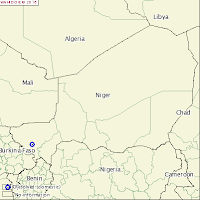 |
| Credit OIE |
#11,425
Avian flu surveillance in across Africa is often - to put it kindly - suboptimal. Our working assumption is that it is far more widespread than is officially reported.
A good example came last March in Libya's Under Reported Burden Of H5N1 (FAO Workshop), where we saw an FAO report which cited `at least 4 deaths' due to H5N1 in Libya beginning in December of 2014, and more than 100 suspected or confirmed poultry outbreaks.
Yet `officially', Libya has never reported a human H5N1 infection to WHO and their only OIE report in 2015 listed 12 chickens affected by H5N1.
West Africa, in particular, has reported a great many outbreaks in poultry, but outside of Egypt, only two human infections have ever been confirmed by the WHO in Africa; one in Djibouti in 2006, and one the following year in Nigeria.
There were three other suspected Nigerian cases at the time - including the mother of the confirmed case in Lagos – but testing was `inconclusive’.
Niger, nestled just north of hard-hit Nigeria, reported a small outbreak of H5N1 in poultry in April of 2015, but nothing since then.
Yesterday Niger authorities notified the OIE of a large (86,000 bird loss) outbreak in the southwest of the country, very near the Burkina Faso border.
Other than the size of this outbreak, the other interesting aspect is that this event took place in February, and it is just now being laboratory confirmed and reported in June.
Last October, in WHO Scales Up Influenza Surveillance In Africa, we looked at the immense challenges facing African nations in preventing, and reporting, avian flu outbreaks.
While we think of Asia and the Nile Valley as the most probable launching sites for novel flu viruses (see EID Journal: Predicting Hotspots for Influenza Virus Reassortment), the rest of the African continent represents a huge blind spot with significant potential.
For more background, you may wish to revisit last summer's FAO: Concerns Rising Over Spread Of Avian Flu In Africa.
